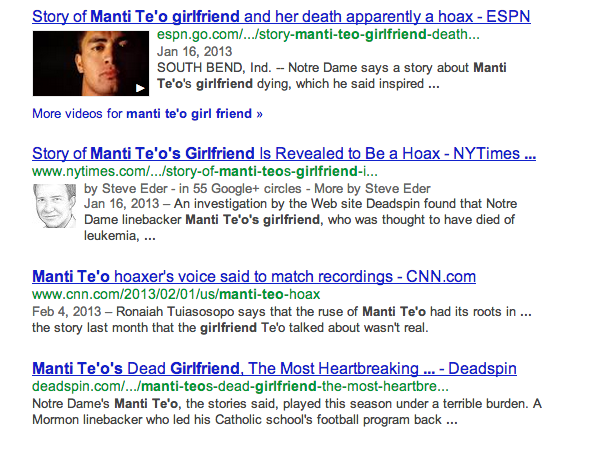Today, Gawker’s Nick Denton issued a mandate that headlines be 70-characters or fewer because of the “tyranny of the search and social algorithms.” The only actual example he refers to is Deadspin’s expose of Manti Te’o’s dead girlfriend hoax:
Why this drastic measure? Google and others truncate headlines at 70 characters. On the Manti Teo story, Deadspin’s scoop fell down the Google search results, overtaken by copycat stories with simpler headlines.
Deadspin’s headline was 118 characters. Vital information — “hoax” — was one of the words that was cut off. Our headline was less intelligible — and less clickworthy — than others. And Google demotes search results that don’t get clicked on.
Denton is right about how the headlines were seen and (likely) wrong about why the headlines rank so low.
He’s right that Deadspin’s headline is terrible for search engine users. The original headline was:
Manti Te’o’s Dead Girlfriend, The Most Heartbreaking And Inspirational Story Of The College Football Season, Is A Hoax
Here’s what happens when you search for Manti Te’o’ and some variation of “hoax” and “girlfriend” in Google today:

So, if you’ve been told that there is a crazy hoax by Manti Te’o and you go to Google to find out, which of these headlines seem more interesting to you?
- Story of Manti Te’o’s Girlfriend Is Revealed to Be a Hoax – NYTimes …
- Story of Manti Te’o girlfriend and her death apparently a hoax – ESPN
- Manti Te’o’s Dead Girlfriend, The Most Heartbreaking … – Deadspin
So Denton’s advice to keep headlines to the point is pretty good advice, although I’d argue that headlines can be longer than 70 characters, if the meat of it (the proper nouns, active verb) are in the first 70 characters.
However, he is wrong in thinking that the less-attractive, less-clickedness of the headline was what makes it rank lower than the NYT and ESPN stories.
Though, again, we don’t know for sure all the factors in PageRank, one of the most-well observed signals is the order of the keywords. When you enter a search query, Google cares about the order of the words, so that “mexican restaurant in new york with good tacos” will bring back a different order of results (or even different results completely) than “mexican restaurant with good tacos in new york”.
In the same way, if these were page titles, Google might consider “mexican restaurant in new york with good tacos” a better “authority” on “Mexican restaurants in New York” than a page titled “mexican restaurant with good tacos in new york.”
So back to Manti Te’o. If you were searching for a story related to Manti Te’o and a hoax, you would query “manti teo hoax”. Notice where those keywords appear in each of these headlines:
- Story of Manti Te’o’s Girlfriend Is Revealed to Be a Hoax – NYTimes …
- Story of Manti Te’o girlfriend and her death apparently a hoax – ESPN
- Manti Te’o’s Dead Girlfriend, The Most Heartbreaking … – Deadspin
What’s especially wrongheaded about Denton’s memo is that he can have good SEO and good headlines, because SEO (and search results display) is primarily affected by the meta title of the article. It’s strange that Gawker, one of the more modern and most prominent publishing platforms, apparently has no way (or policy) to set the headline differently from the title of an article.
For example, the headline of this Gawker article is: “Feral, Thieving Mountain Men Keep Emerging from America’s Woods, Unwillingly.” This is the same as the title of the article, which is set in the meta tags of article’s HTML. It is this meta-title field that shows up in search engine results.
Presumably, this ranks highly for anyone searching for “feral thieving mountain men.”
But if you were looking for news on the actual “Troy Knapp, the notorious ‘Mountain Man’ outlaw”, you would probably Google for “mountain man outlaw” or “troy knapp outlaw”.
Apparently, even the staid old New Yorker magazine has more Internet savvy than Gawker when it comes to SEO. In this article about a Florida man’s curious trade in dinosaur bones, the headline gets to be all punny – Bones of Contention – while the meta title just lays down the facts for SEO-goodness: “Paige Williams: Eric Prokopi’s Curious Trade in Mongolian Dinosaurs”